NURS11157 Lifespan Approach to Health: A Dementia Case Study Analysis
VerifiedAdded on 2021/04/17
|11
|3614
|31
Case Study
AI Summary
This case study, submitted by Arishma Devi for NURS11157, examines dementia through a lifespan approach, focusing on health decisions and care strategies for an individual named Ross. The essay delves into the identification of health concerns, the impact of societal inequalities, and the bio-psycho-social-spiritual factors associated with dementia. It discusses psychological issues, care undertaken by nurses, and the principles to be followed throughout the lifespan. The study emphasizes the importance of health promotion and illness prevention in managing dementia, including strategies for creating awareness and providing supportive care. The case study highlights the challenges faced by individuals with dementia and their families, as well as the role of nurses in supporting patients, designing treatment plans, and promoting quality of life. The document also includes an abstract, table of contents, and references, demonstrating a comprehensive analysis of the topic.
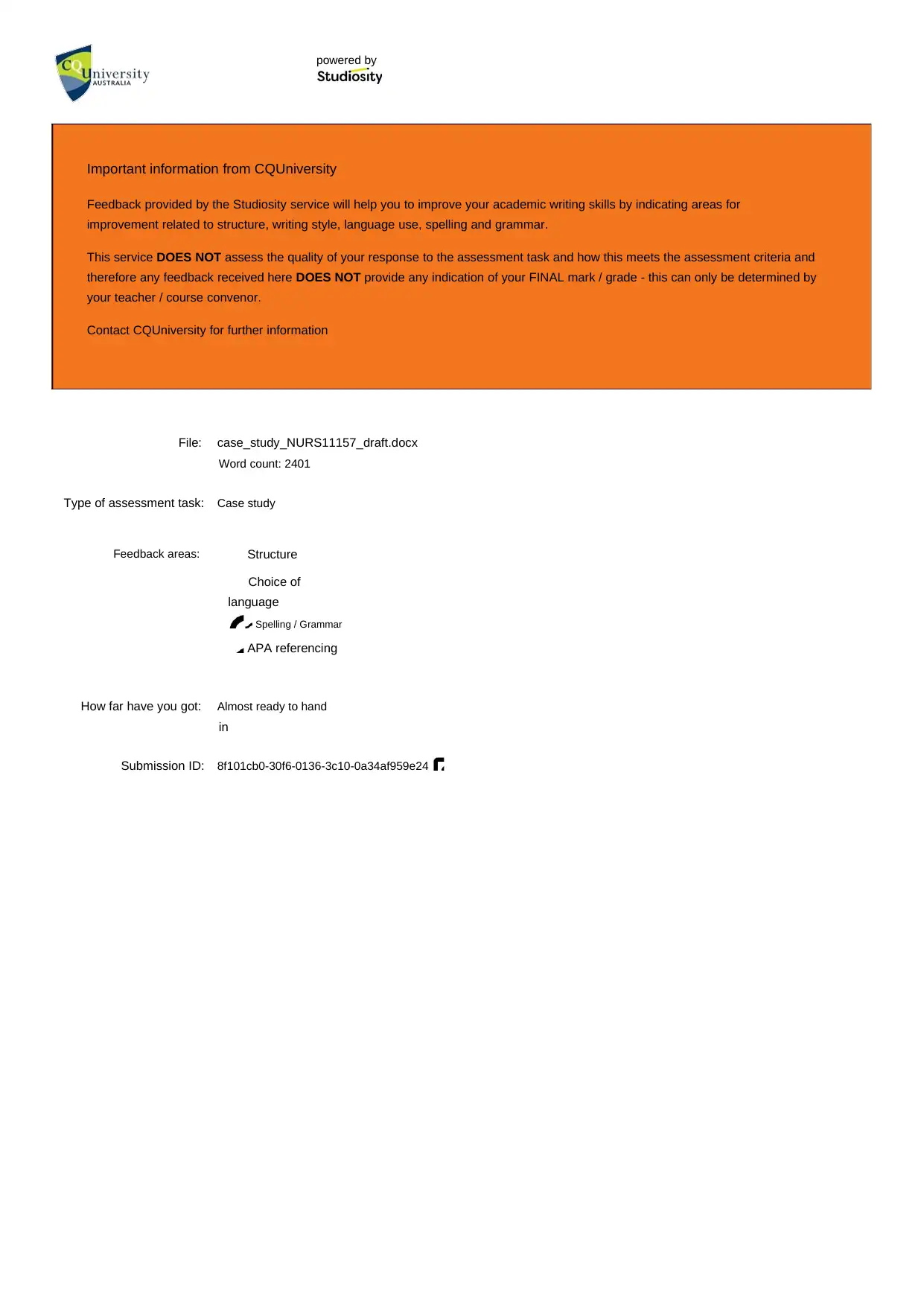
powered by
Important information from CQUniversity
Feedback provided by the Studiosity service will help you to improve your academic writing skills by indicating areas for
improvement related to structure, writing style, language use, spelling and grammar.
This service DOES NOT assess the quality of your response to the assessment task and how this meets the assessment criteria and
therefore any feedback received here DOES NOT provide any indication of your FINAL mark / grade - this can only be determined by
your teacher / course convenor.
Contact CQUniversity for further information
File: case_study_NURS11157_draft.docx
Word count: 2401
Type of assessment task: Case study
Feedback areas: Structure
Choice of
language
Spelling / Grammar
APA referencing
How far have you got: Almost ready to hand
in
Submission ID: 8f101cb0-30f6-0136-3c10-0a34af959e24
Important information from CQUniversity
Feedback provided by the Studiosity service will help you to improve your academic writing skills by indicating areas for
improvement related to structure, writing style, language use, spelling and grammar.
This service DOES NOT assess the quality of your response to the assessment task and how this meets the assessment criteria and
therefore any feedback received here DOES NOT provide any indication of your FINAL mark / grade - this can only be determined by
your teacher / course convenor.
Contact CQUniversity for further information
File: case_study_NURS11157_draft.docx
Word count: 2401
Type of assessment task: Case study
Feedback areas: Structure
Choice of
language
Spelling / Grammar
APA referencing
How far have you got: Almost ready to hand
in
Submission ID: 8f101cb0-30f6-0136-3c10-0a34af959e24
Paraphrase This Document
Need a fresh take? Get an instant paraphrase of this document with our AI Paraphraser
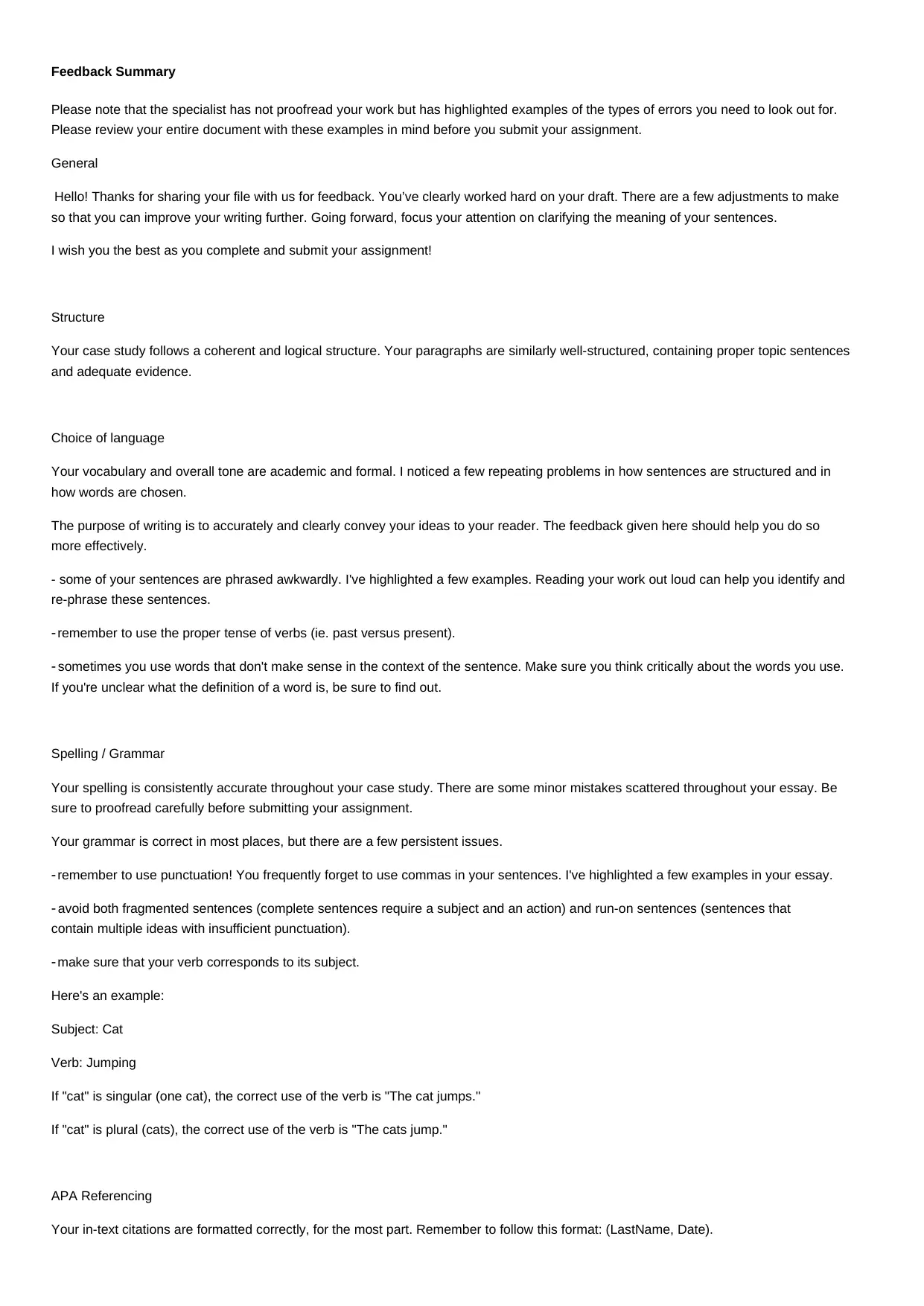
Feedback Summary
Please note that the specialist has not proofread your work but has highlighted examples of the types of errors you need to look out for.
Please review your entire document with these examples in mind before you submit your assignment.
General
Hello! Thanks for sharing your file with us for feedback. You’ve clearly worked hard on your draft. There are a few adjustments to make
so that you can improve your writing further. Going forward, focus your attention on clarifying the meaning of your sentences.
I wish you the best as you complete and submit your assignment!
Structure
Your case study follows a coherent and logical structure. Your paragraphs are similarly well-structured, containing proper topic sentences
and adequate evidence.
Choice of language
Your vocabulary and overall tone are academic and formal. I noticed a few repeating problems in how sentences are structured and in
how words are chosen.
The purpose of writing is to accurately and clearly convey your ideas to your reader. The feedback given here should help you do so
more effectively.
- some of your sentences are phrased awkwardly. I've highlighted a few examples. Reading your work out loud can help you identify and
re-phrase these sentences.
- remember to use the proper tense of verbs (ie. past versus present).
- sometimes you use words that don't make sense in the context of the sentence. Make sure you think critically about the words you use.
If you're unclear what the definition of a word is, be sure to find out.
Spelling / Grammar
Your spelling is consistently accurate throughout your case study. There are some minor mistakes scattered throughout your essay. Be
sure to proofread carefully before submitting your assignment.
Your grammar is correct in most places, but there are a few persistent issues.
- remember to use punctuation! You frequently forget to use commas in your sentences. I've highlighted a few examples in your essay.
- avoid both fragmented sentences (complete sentences require a subject and an action) and run-on sentences (sentences that
contain multiple ideas with insufficient punctuation).
- make sure that your verb corresponds to its subject.
Here's an example:
Subject: Cat
Verb: Jumping
If "cat" is singular (one cat), the correct use of the verb is "The cat jumps."
If "cat" is plural (cats), the correct use of the verb is "The cats jump."
APA Referencing
Your in-text citations are formatted correctly, for the most part. Remember to follow this format: (LastName, Date).
Please note that the specialist has not proofread your work but has highlighted examples of the types of errors you need to look out for.
Please review your entire document with these examples in mind before you submit your assignment.
General
Hello! Thanks for sharing your file with us for feedback. You’ve clearly worked hard on your draft. There are a few adjustments to make
so that you can improve your writing further. Going forward, focus your attention on clarifying the meaning of your sentences.
I wish you the best as you complete and submit your assignment!
Structure
Your case study follows a coherent and logical structure. Your paragraphs are similarly well-structured, containing proper topic sentences
and adequate evidence.
Choice of language
Your vocabulary and overall tone are academic and formal. I noticed a few repeating problems in how sentences are structured and in
how words are chosen.
The purpose of writing is to accurately and clearly convey your ideas to your reader. The feedback given here should help you do so
more effectively.
- some of your sentences are phrased awkwardly. I've highlighted a few examples. Reading your work out loud can help you identify and
re-phrase these sentences.
- remember to use the proper tense of verbs (ie. past versus present).
- sometimes you use words that don't make sense in the context of the sentence. Make sure you think critically about the words you use.
If you're unclear what the definition of a word is, be sure to find out.
Spelling / Grammar
Your spelling is consistently accurate throughout your case study. There are some minor mistakes scattered throughout your essay. Be
sure to proofread carefully before submitting your assignment.
Your grammar is correct in most places, but there are a few persistent issues.
- remember to use punctuation! You frequently forget to use commas in your sentences. I've highlighted a few examples in your essay.
- avoid both fragmented sentences (complete sentences require a subject and an action) and run-on sentences (sentences that
contain multiple ideas with insufficient punctuation).
- make sure that your verb corresponds to its subject.
Here's an example:
Subject: Cat
Verb: Jumping
If "cat" is singular (one cat), the correct use of the verb is "The cat jumps."
If "cat" is plural (cats), the correct use of the verb is "The cats jump."
APA Referencing
Your in-text citations are formatted correctly, for the most part. Remember to follow this format: (LastName, Date).

Your references list contains the relevant information, but there are some formatting errors.
Citing is a precise practise. Make sure you follow a guide closely. The placement of periods, commas, and italics matters.
When referencing journal articles, they need to follow this exact format:
Author, A. A., Author, B. B., & Author, C. C. (Year). Title of article. Title of Periodical, volume number(issue number),
pages. http://doi.org/xx.xxx/yyyyy
Citing is a precise practise. Make sure you follow a guide closely. The placement of periods, commas, and italics matters.
When referencing journal articles, they need to follow this exact format:
Author, A. A., Author, B. B., & Author, C. C. (Year). Title of article. Title of Periodical, volume number(issue number),
pages. http://doi.org/xx.xxx/yyyyy
⊘ This is a preview!⊘
Do you want full access?
Subscribe today to unlock all pages.

Trusted by 1+ million students worldwide
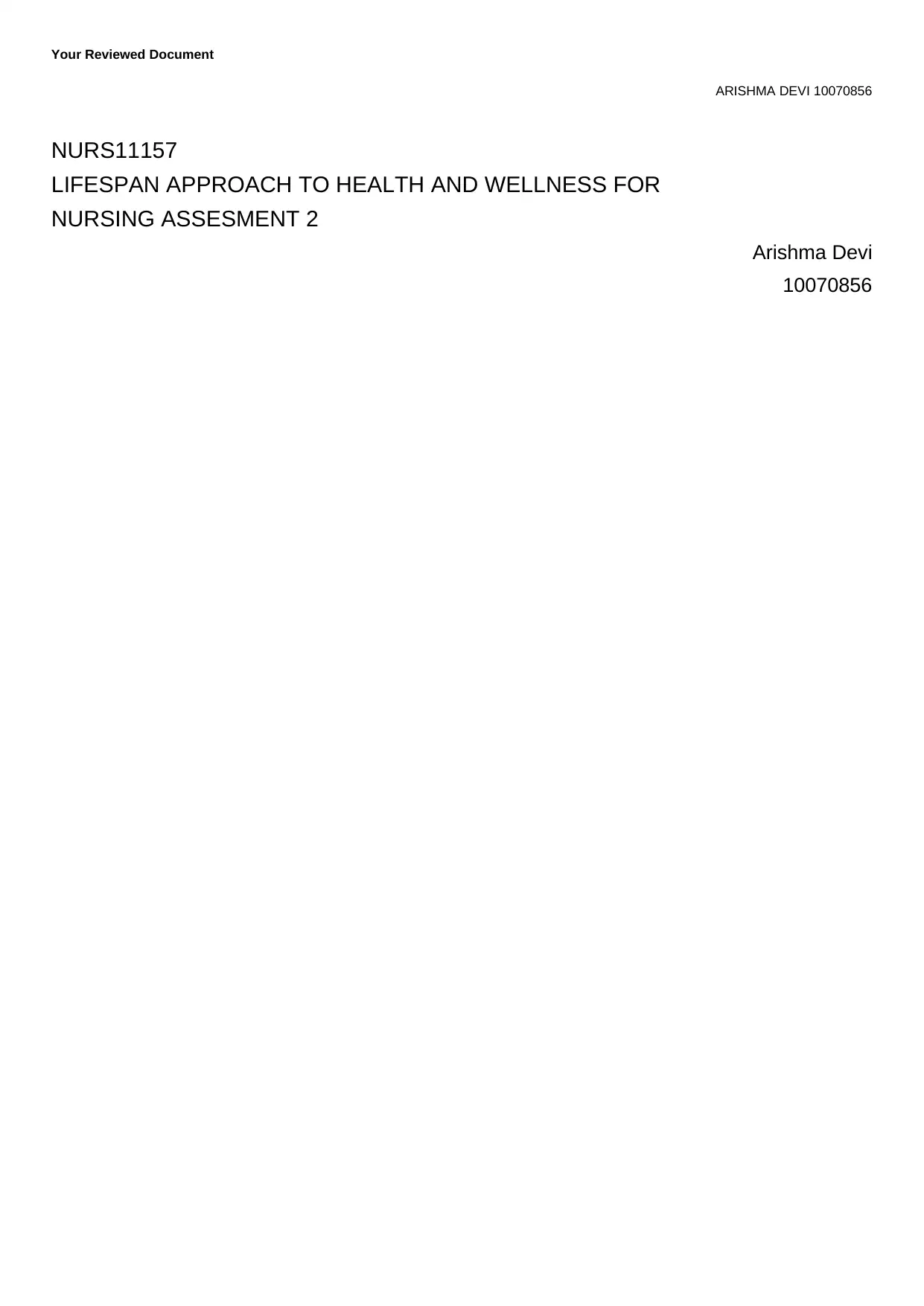
Your Reviewed Document
ARISHMA DEVI 10070856
NURS11157
LIFESPAN APPROACH TO HEALTH AND WELLNESS FOR
NURSING ASSESMENT 2
Arishma Devi
10070856
ARISHMA DEVI 10070856
NURS11157
LIFESPAN APPROACH TO HEALTH AND WELLNESS FOR
NURSING ASSESMENT 2
Arishma Devi
10070856
Paraphrase This Document
Need a fresh take? Get an instant paraphrase of this document with our AI Paraphraser

Abstract
In this essay, a detailed discussion is done about dementia. A suffering of Ross is discussed by identifying health concerns
and what decisions could be made for improvement. Impact of inequalities in the society, how it affect the individual and
detailed discussion of Psycho-physiological aspects of health is done. Health Promotion can be considered as an important
factor for preventing the disease and also helps to create awareness about the disease to people. Health promotion helps in
gaining acceptance worldwide as it is defines a process which enables people to increase control to improve health
conditions.
In this essay, a detailed discussion is done about dementia. A suffering of Ross is discussed by identifying health concerns
and what decisions could be made for improvement. Impact of inequalities in the society, how it affect the individual and
detailed discussion of Psycho-physiological aspects of health is done. Health Promotion can be considered as an important
factor for preventing the disease and also helps to create awareness about the disease to people. Health promotion helps in
gaining acceptance worldwide as it is defines a process which enables people to increase control to improve health
conditions.

Table of Contents
Introduction 3
Discussion 3
Lifespan approach 4
Health decisions 5
Bio-Psycho Social-Spiritual Factors of Dementia 5
Psychological issues 6
Care undertaken: 6
Principals to follow for entire lifespan 7
Illness prevention and health promotion impacts 8
Conclusion 10
References 11
Introduction 3
Discussion 3
Lifespan approach 4
Health decisions 5
Bio-Psycho Social-Spiritual Factors of Dementia 5
Psychological issues 6
Care undertaken: 6
Principals to follow for entire lifespan 7
Illness prevention and health promotion impacts 8
Conclusion 10
References 11
⊘ This is a preview!⊘
Do you want full access?
Subscribe today to unlock all pages.

Trusted by 1+ million students worldwide
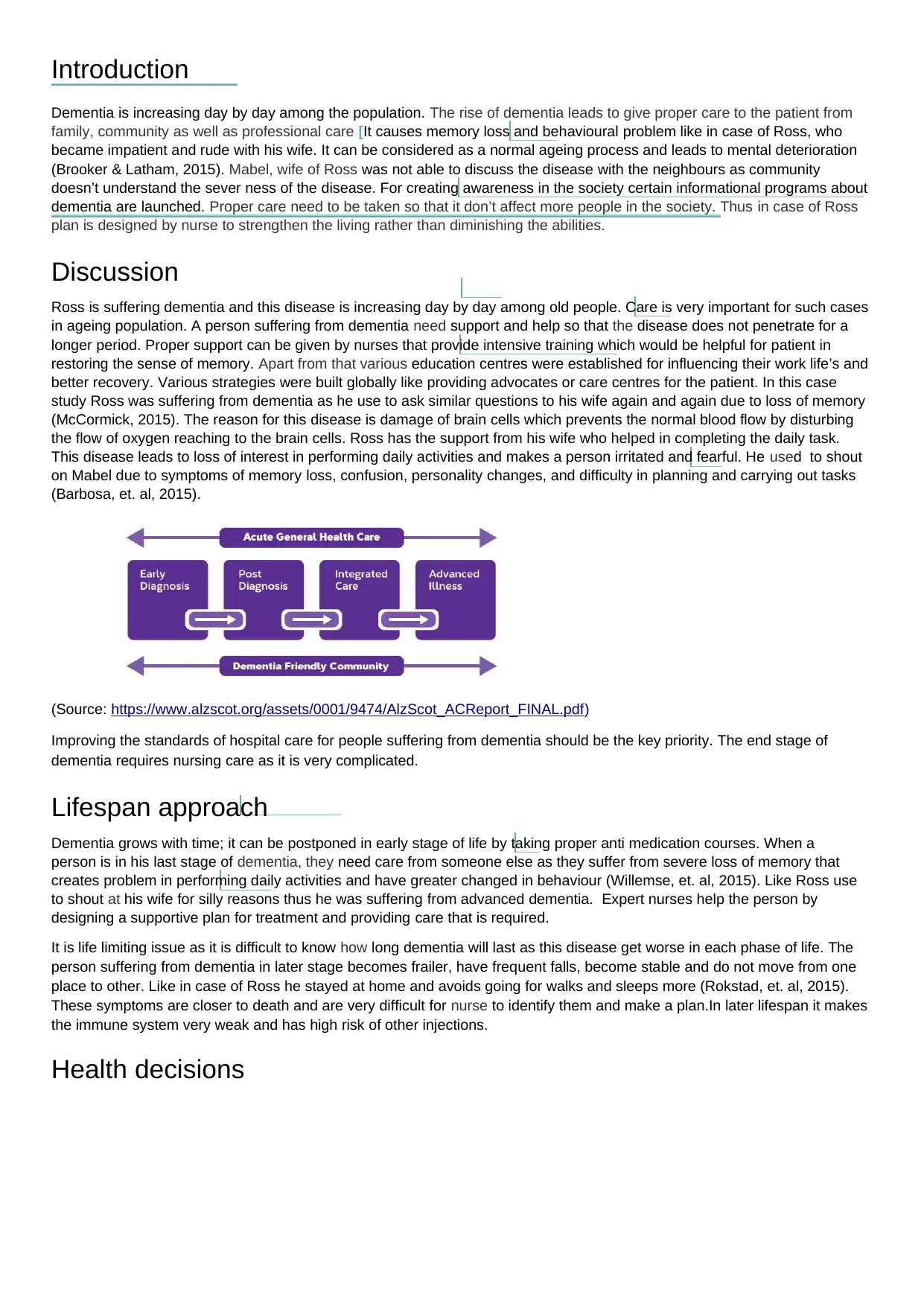
Introduction
Dementia is increasing day by day among the population. The rise of dementia leads to give proper care to the patient from
family, community as well as professional care [It causes memory loss and behavioural problem like in case of Ross, who
became impatient and rude with his wife. It can be considered as a normal ageing process and leads to mental deterioration
(Brooker & Latham, 2015). Mabel, wife of Ross was not able to discuss the disease with the neighbours as community
doesn’t understand the sever ness of the disease. For creating awareness in the society certain informational programs about
dementia are launched. Proper care need to be taken so that it don’t affect more people in the society. Thus in case of Ross
plan is designed by nurse to strengthen the living rather than diminishing the abilities.
Discussion
Ross is suffering dementia and this disease is increasing day by day among old people. Care is very important for such cases
in ageing population. A person suffering from dementia need support and help so that the disease does not penetrate for a
longer period. Proper support can be given by nurses that provide intensive training which would be helpful for patient in
restoring the sense of memory. Apart from that various education centres were established for influencing their work life’s and
better recovery. Various strategies were built globally like providing advocates or care centres for the patient. In this case
study Ross was suffering from dementia as he use to ask similar questions to his wife again and again due to loss of memory
(McCormick, 2015). The reason for this disease is damage of brain cells which prevents the normal blood flow by disturbing
the flow of oxygen reaching to the brain cells. Ross has the support from his wife who helped in completing the daily task.
This disease leads to loss of interest in performing daily activities and makes a person irritated and fearful. He used to shout
on Mabel due to symptoms of memory loss, confusion, personality changes, and difficulty in planning and carrying out tasks
(Barbosa, et. al, 2015).
(Source: https://www.alzscot.org/assets/0001/9474/AlzScot_ACReport_FINAL.pdf)
Improving the standards of hospital care for people suffering from dementia should be the key priority. The end stage of
dementia requires nursing care as it is very complicated.
Lifespan approach
Dementia grows with time; it can be postponed in early stage of life by taking proper anti medication courses. When a
person is in his last stage of dementia, they need care from someone else as they suffer from severe loss of memory that
creates problem in performing daily activities and have greater changed in behaviour (Willemse, et. al, 2015). Like Ross use
to shout at his wife for silly reasons thus he was suffering from advanced dementia. Expert nurses help the person by
designing a supportive plan for treatment and providing care that is required.
It is life limiting issue as it is difficult to know how long dementia will last as this disease get worse in each phase of life. The
person suffering from dementia in later stage becomes frailer, have frequent falls, become stable and do not move from one
place to other. Like in case of Ross he stayed at home and avoids going for walks and sleeps more (Rokstad, et. al, 2015).
These symptoms are closer to death and are very difficult for nurse to identify them and make a plan.In later lifespan it makes
the immune system very weak and has high risk of other injections.
Health decisions
Dementia is increasing day by day among the population. The rise of dementia leads to give proper care to the patient from
family, community as well as professional care [It causes memory loss and behavioural problem like in case of Ross, who
became impatient and rude with his wife. It can be considered as a normal ageing process and leads to mental deterioration
(Brooker & Latham, 2015). Mabel, wife of Ross was not able to discuss the disease with the neighbours as community
doesn’t understand the sever ness of the disease. For creating awareness in the society certain informational programs about
dementia are launched. Proper care need to be taken so that it don’t affect more people in the society. Thus in case of Ross
plan is designed by nurse to strengthen the living rather than diminishing the abilities.
Discussion
Ross is suffering dementia and this disease is increasing day by day among old people. Care is very important for such cases
in ageing population. A person suffering from dementia need support and help so that the disease does not penetrate for a
longer period. Proper support can be given by nurses that provide intensive training which would be helpful for patient in
restoring the sense of memory. Apart from that various education centres were established for influencing their work life’s and
better recovery. Various strategies were built globally like providing advocates or care centres for the patient. In this case
study Ross was suffering from dementia as he use to ask similar questions to his wife again and again due to loss of memory
(McCormick, 2015). The reason for this disease is damage of brain cells which prevents the normal blood flow by disturbing
the flow of oxygen reaching to the brain cells. Ross has the support from his wife who helped in completing the daily task.
This disease leads to loss of interest in performing daily activities and makes a person irritated and fearful. He used to shout
on Mabel due to symptoms of memory loss, confusion, personality changes, and difficulty in planning and carrying out tasks
(Barbosa, et. al, 2015).
(Source: https://www.alzscot.org/assets/0001/9474/AlzScot_ACReport_FINAL.pdf)
Improving the standards of hospital care for people suffering from dementia should be the key priority. The end stage of
dementia requires nursing care as it is very complicated.
Lifespan approach
Dementia grows with time; it can be postponed in early stage of life by taking proper anti medication courses. When a
person is in his last stage of dementia, they need care from someone else as they suffer from severe loss of memory that
creates problem in performing daily activities and have greater changed in behaviour (Willemse, et. al, 2015). Like Ross use
to shout at his wife for silly reasons thus he was suffering from advanced dementia. Expert nurses help the person by
designing a supportive plan for treatment and providing care that is required.
It is life limiting issue as it is difficult to know how long dementia will last as this disease get worse in each phase of life. The
person suffering from dementia in later stage becomes frailer, have frequent falls, become stable and do not move from one
place to other. Like in case of Ross he stayed at home and avoids going for walks and sleeps more (Rokstad, et. al, 2015).
These symptoms are closer to death and are very difficult for nurse to identify them and make a plan.In later lifespan it makes
the immune system very weak and has high risk of other injections.
Health decisions
Paraphrase This Document
Need a fresh take? Get an instant paraphrase of this document with our AI Paraphraser
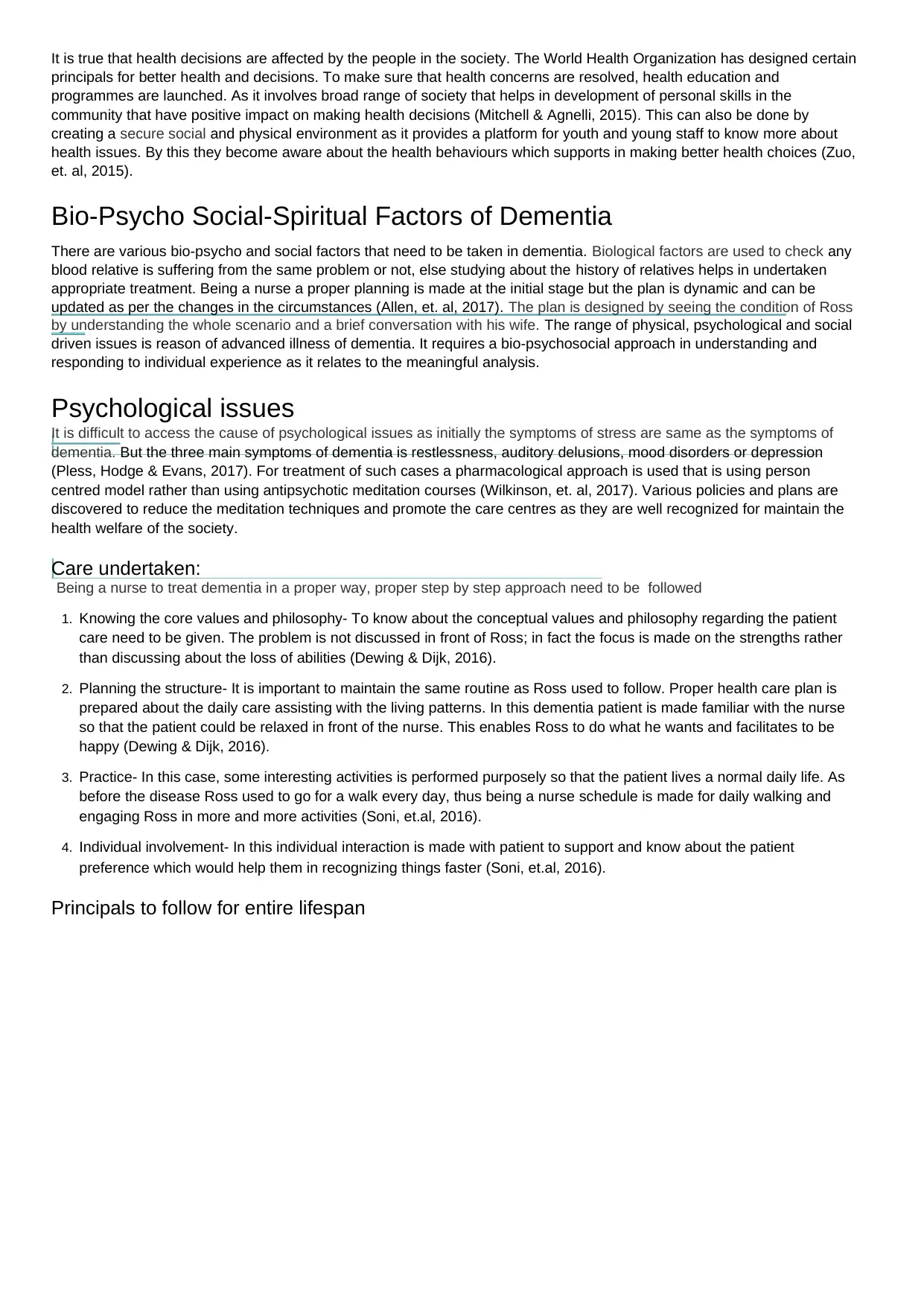
It is true that health decisions are affected by the people in the society. The World Health Organization has designed certain
principals for better health and decisions. To make sure that health concerns are resolved, health education and
programmes are launched. As it involves broad range of society that helps in development of personal skills in the
community that have positive impact on making health decisions (Mitchell & Agnelli, 2015). This can also be done by
creating a secure social and physical environment as it provides a platform for youth and young staff to know more about
health issues. By this they become aware about the health behaviours which supports in making better health choices (Zuo,
et. al, 2015).
Bio-Psycho Social-Spiritual Factors of Dementia
There are various bio-psycho and social factors that need to be taken in dementia. Biological factors are used to check any
blood relative is suffering from the same problem or not, else studying about the history of relatives helps in undertaken
appropriate treatment. Being a nurse a proper planning is made at the initial stage but the plan is dynamic and can be
updated as per the changes in the circumstances (Allen, et. al, 2017). The plan is designed by seeing the condition of Ross
by understanding the whole scenario and a brief conversation with his wife. The range of physical, psychological and social
driven issues is reason of advanced illness of dementia. It requires a bio-psychosocial approach in understanding and
responding to individual experience as it relates to the meaningful analysis.
Psychological issues
It is difficult to access the cause of psychological issues as initially the symptoms of stress are same as the symptoms of
dementia. But the three main symptoms of dementia is restlessness, auditory delusions, mood disorders or depression
(Pless, Hodge & Evans, 2017). For treatment of such cases a pharmacological approach is used that is using person
centred model rather than using antipsychotic meditation courses (Wilkinson, et. al, 2017). Various policies and plans are
discovered to reduce the meditation techniques and promote the care centres as they are well recognized for maintain the
health welfare of the society.
Care undertaken:
Being a nurse to treat dementia in a proper way, proper step by step approach need to be followed
1. Knowing the core values and philosophy- To know about the conceptual values and philosophy regarding the patient
care need to be given. The problem is not discussed in front of Ross; in fact the focus is made on the strengths rather
than discussing about the loss of abilities (Dewing & Dijk, 2016).
2. Planning the structure- It is important to maintain the same routine as Ross used to follow. Proper health care plan is
prepared about the daily care assisting with the living patterns. In this dementia patient is made familiar with the nurse
so that the patient could be relaxed in front of the nurse. This enables Ross to do what he wants and facilitates to be
happy (Dewing & Dijk, 2016).
3. Practice- In this case, some interesting activities is performed purposely so that the patient lives a normal daily life. As
before the disease Ross used to go for a walk every day, thus being a nurse schedule is made for daily walking and
engaging Ross in more and more activities (Soni, et.al, 2016).
4. Individual involvement- In this individual interaction is made with patient to support and know about the patient
preference which would help them in recognizing things faster (Soni, et.al, 2016).
Principals to follow for entire lifespan
principals for better health and decisions. To make sure that health concerns are resolved, health education and
programmes are launched. As it involves broad range of society that helps in development of personal skills in the
community that have positive impact on making health decisions (Mitchell & Agnelli, 2015). This can also be done by
creating a secure social and physical environment as it provides a platform for youth and young staff to know more about
health issues. By this they become aware about the health behaviours which supports in making better health choices (Zuo,
et. al, 2015).
Bio-Psycho Social-Spiritual Factors of Dementia
There are various bio-psycho and social factors that need to be taken in dementia. Biological factors are used to check any
blood relative is suffering from the same problem or not, else studying about the history of relatives helps in undertaken
appropriate treatment. Being a nurse a proper planning is made at the initial stage but the plan is dynamic and can be
updated as per the changes in the circumstances (Allen, et. al, 2017). The plan is designed by seeing the condition of Ross
by understanding the whole scenario and a brief conversation with his wife. The range of physical, psychological and social
driven issues is reason of advanced illness of dementia. It requires a bio-psychosocial approach in understanding and
responding to individual experience as it relates to the meaningful analysis.
Psychological issues
It is difficult to access the cause of psychological issues as initially the symptoms of stress are same as the symptoms of
dementia. But the three main symptoms of dementia is restlessness, auditory delusions, mood disorders or depression
(Pless, Hodge & Evans, 2017). For treatment of such cases a pharmacological approach is used that is using person
centred model rather than using antipsychotic meditation courses (Wilkinson, et. al, 2017). Various policies and plans are
discovered to reduce the meditation techniques and promote the care centres as they are well recognized for maintain the
health welfare of the society.
Care undertaken:
Being a nurse to treat dementia in a proper way, proper step by step approach need to be followed
1. Knowing the core values and philosophy- To know about the conceptual values and philosophy regarding the patient
care need to be given. The problem is not discussed in front of Ross; in fact the focus is made on the strengths rather
than discussing about the loss of abilities (Dewing & Dijk, 2016).
2. Planning the structure- It is important to maintain the same routine as Ross used to follow. Proper health care plan is
prepared about the daily care assisting with the living patterns. In this dementia patient is made familiar with the nurse
so that the patient could be relaxed in front of the nurse. This enables Ross to do what he wants and facilitates to be
happy (Dewing & Dijk, 2016).
3. Practice- In this case, some interesting activities is performed purposely so that the patient lives a normal daily life. As
before the disease Ross used to go for a walk every day, thus being a nurse schedule is made for daily walking and
engaging Ross in more and more activities (Soni, et.al, 2016).
4. Individual involvement- In this individual interaction is made with patient to support and know about the patient
preference which would help them in recognizing things faster (Soni, et.al, 2016).
Principals to follow for entire lifespan
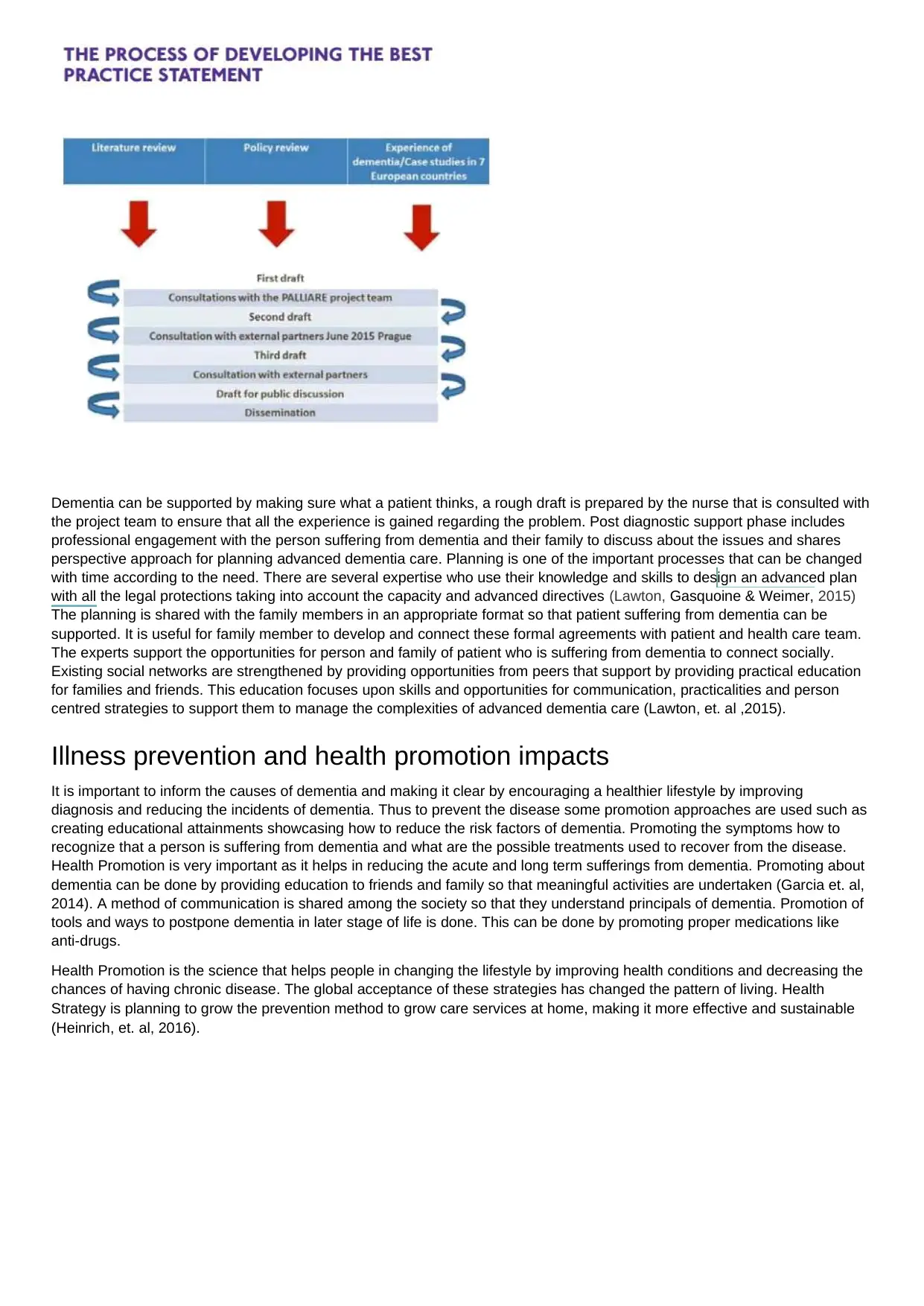
Dementia can be supported by making sure what a patient thinks, a rough draft is prepared by the nurse that is consulted with
the project team to ensure that all the experience is gained regarding the problem. Post diagnostic support phase includes
professional engagement with the person suffering from dementia and their family to discuss about the issues and shares
perspective approach for planning advanced dementia care. Planning is one of the important processes that can be changed
with time according to the need. There are several expertise who use their knowledge and skills to design an advanced plan
with all the legal protections taking into account the capacity and advanced directives (Lawton, Gasquoine & Weimer, 2015)
The planning is shared with the family members in an appropriate format so that patient suffering from dementia can be
supported. It is useful for family member to develop and connect these formal agreements with patient and health care team.
The experts support the opportunities for person and family of patient who is suffering from dementia to connect socially.
Existing social networks are strengthened by providing opportunities from peers that support by providing practical education
for families and friends. This education focuses upon skills and opportunities for communication, practicalities and person
centred strategies to support them to manage the complexities of advanced dementia care (Lawton, et. al ,2015).
Illness prevention and health promotion impacts
It is important to inform the causes of dementia and making it clear by encouraging a healthier lifestyle by improving
diagnosis and reducing the incidents of dementia. Thus to prevent the disease some promotion approaches are used such as
creating educational attainments showcasing how to reduce the risk factors of dementia. Promoting the symptoms how to
recognize that a person is suffering from dementia and what are the possible treatments used to recover from the disease.
Health Promotion is very important as it helps in reducing the acute and long term sufferings from dementia. Promoting about
dementia can be done by providing education to friends and family so that meaningful activities are undertaken (Garcia et. al,
2014). A method of communication is shared among the society so that they understand principals of dementia. Promotion of
tools and ways to postpone dementia in later stage of life is done. This can be done by promoting proper medications like
anti-drugs.
Health Promotion is the science that helps people in changing the lifestyle by improving health conditions and decreasing the
chances of having chronic disease. The global acceptance of these strategies has changed the pattern of living. Health
Strategy is planning to grow the prevention method to grow care services at home, making it more effective and sustainable
(Heinrich, et. al, 2016).
the project team to ensure that all the experience is gained regarding the problem. Post diagnostic support phase includes
professional engagement with the person suffering from dementia and their family to discuss about the issues and shares
perspective approach for planning advanced dementia care. Planning is one of the important processes that can be changed
with time according to the need. There are several expertise who use their knowledge and skills to design an advanced plan
with all the legal protections taking into account the capacity and advanced directives (Lawton, Gasquoine & Weimer, 2015)
The planning is shared with the family members in an appropriate format so that patient suffering from dementia can be
supported. It is useful for family member to develop and connect these formal agreements with patient and health care team.
The experts support the opportunities for person and family of patient who is suffering from dementia to connect socially.
Existing social networks are strengthened by providing opportunities from peers that support by providing practical education
for families and friends. This education focuses upon skills and opportunities for communication, practicalities and person
centred strategies to support them to manage the complexities of advanced dementia care (Lawton, et. al ,2015).
Illness prevention and health promotion impacts
It is important to inform the causes of dementia and making it clear by encouraging a healthier lifestyle by improving
diagnosis and reducing the incidents of dementia. Thus to prevent the disease some promotion approaches are used such as
creating educational attainments showcasing how to reduce the risk factors of dementia. Promoting the symptoms how to
recognize that a person is suffering from dementia and what are the possible treatments used to recover from the disease.
Health Promotion is very important as it helps in reducing the acute and long term sufferings from dementia. Promoting about
dementia can be done by providing education to friends and family so that meaningful activities are undertaken (Garcia et. al,
2014). A method of communication is shared among the society so that they understand principals of dementia. Promotion of
tools and ways to postpone dementia in later stage of life is done. This can be done by promoting proper medications like
anti-drugs.
Health Promotion is the science that helps people in changing the lifestyle by improving health conditions and decreasing the
chances of having chronic disease. The global acceptance of these strategies has changed the pattern of living. Health
Strategy is planning to grow the prevention method to grow care services at home, making it more effective and sustainable
(Heinrich, et. al, 2016).
⊘ This is a preview!⊘
Do you want full access?
Subscribe today to unlock all pages.

Trusted by 1+ million students worldwide

Conclusion
In this it can be concluded from the case study that Ross suffering from dementia , needs proper medication care by the
nurse to recovery from the disease. There are various factors that affect the prevention of disease. There are various
stages of dementia, thus to make sure that it don’t propagate for long time some prevention measures are undertaken.
Health promotion is also an important part for making society aware about the issues of disease and its measures.
Protective factors for dementia include educational programs, physical activities and avoiding bad habits. Dementia
represents a major issue in the public health and can be cured by ensuring to reduce risk of dementia.
In this it can be concluded from the case study that Ross suffering from dementia , needs proper medication care by the
nurse to recovery from the disease. There are various factors that affect the prevention of disease. There are various
stages of dementia, thus to make sure that it don’t propagate for long time some prevention measures are undertaken.
Health promotion is also an important part for making society aware about the issues of disease and its measures.
Protective factors for dementia include educational programs, physical activities and avoiding bad habits. Dementia
represents a major issue in the public health and can be cured by ensuring to reduce risk of dementia.
Paraphrase This Document
Need a fresh take? Get an instant paraphrase of this document with our AI Paraphraser
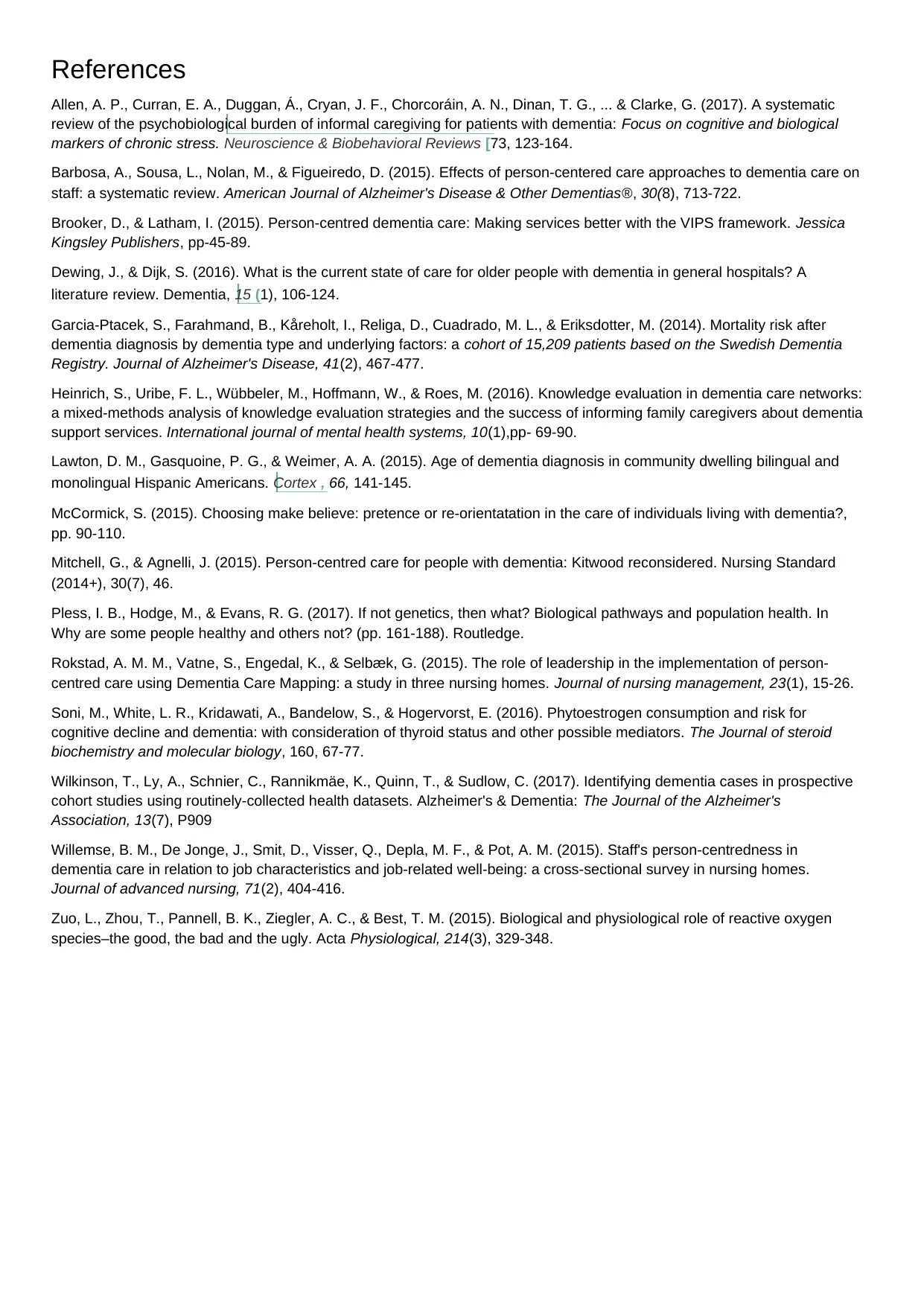
References
Allen, A. P., Curran, E. A., Duggan, Á., Cryan, J. F., Chorcoráin, A. N., Dinan, T. G., ... & Clarke, G. (2017). A systematic
review of the psychobiological burden of informal caregiving for patients with dementia: Focus on cognitive and biological
markers of chronic stress. Neuroscience & Biobehavioral Reviews [73, 123-164.
Barbosa, A., Sousa, L., Nolan, M., & Figueiredo, D. (2015). Effects of person-centered care approaches to dementia care on
staff: a systematic review. American Journal of Alzheimer's Disease & Other Dementias®, 30(8), 713-722.
Brooker, D., & Latham, I. (2015). Person-centred dementia care: Making services better with the VIPS framework. Jessica
Kingsley Publishers, pp-45-89.
Dewing, J., & Dijk, S. (2016). What is the current state of care for older people with dementia in general hospitals? A
literature review. Dementia, 15 (1), 106-124.
Garcia-Ptacek, S., Farahmand, B., Kåreholt, I., Religa, D., Cuadrado, M. L., & Eriksdotter, M. (2014). Mortality risk after
dementia diagnosis by dementia type and underlying factors: a cohort of 15,209 patients based on the Swedish Dementia
Registry. Journal of Alzheimer's Disease, 41(2), 467-477.
Heinrich, S., Uribe, F. L., Wübbeler, M., Hoffmann, W., & Roes, M. (2016). Knowledge evaluation in dementia care networks:
a mixed-methods analysis of knowledge evaluation strategies and the success of informing family caregivers about dementia
support services. International journal of mental health systems, 10(1),pp- 69-90.
Lawton, D. M., Gasquoine, P. G., & Weimer, A. A. (2015). Age of dementia diagnosis in community dwelling bilingual and
monolingual Hispanic Americans. Cortex , 66, 141-145.
McCormick, S. (2015). Choosing make believe: pretence or re-orientatation in the care of individuals living with dementia?,
pp. 90-110.
Mitchell, G., & Agnelli, J. (2015). Person-centred care for people with dementia: Kitwood reconsidered. Nursing Standard
(2014+), 30(7), 46.
Pless, I. B., Hodge, M., & Evans, R. G. (2017). If not genetics, then what? Biological pathways and population health. In
Why are some people healthy and others not? (pp. 161-188). Routledge.
Rokstad, A. M. M., Vatne, S., Engedal, K., & Selbæk, G. (2015). The role of leadership in the implementation of person-
centred care using Dementia Care Mapping: a study in three nursing homes. Journal of nursing management, 23(1), 15-26.
Soni, M., White, L. R., Kridawati, A., Bandelow, S., & Hogervorst, E. (2016). Phytoestrogen consumption and risk for
cognitive decline and dementia: with consideration of thyroid status and other possible mediators. The Journal of steroid
biochemistry and molecular biology, 160, 67-77.
Wilkinson, T., Ly, A., Schnier, C., Rannikmäe, K., Quinn, T., & Sudlow, C. (2017). Identifying dementia cases in prospective
cohort studies using routinely-collected health datasets. Alzheimer's & Dementia: The Journal of the Alzheimer's
Association, 13(7), P909
Willemse, B. M., De Jonge, J., Smit, D., Visser, Q., Depla, M. F., & Pot, A. M. (2015). Staff's person-centredness in
dementia care in relation to job characteristics and job-related well-being: a cross-sectional survey in nursing homes.
Journal of advanced nursing, 71(2), 404-416.
Zuo, L., Zhou, T., Pannell, B. K., Ziegler, A. C., & Best, T. M. (2015). Biological and physiological role of reactive oxygen
species–the good, the bad and the ugly. Acta Physiological, 214(3), 329-348.
Allen, A. P., Curran, E. A., Duggan, Á., Cryan, J. F., Chorcoráin, A. N., Dinan, T. G., ... & Clarke, G. (2017). A systematic
review of the psychobiological burden of informal caregiving for patients with dementia: Focus on cognitive and biological
markers of chronic stress. Neuroscience & Biobehavioral Reviews [73, 123-164.
Barbosa, A., Sousa, L., Nolan, M., & Figueiredo, D. (2015). Effects of person-centered care approaches to dementia care on
staff: a systematic review. American Journal of Alzheimer's Disease & Other Dementias®, 30(8), 713-722.
Brooker, D., & Latham, I. (2015). Person-centred dementia care: Making services better with the VIPS framework. Jessica
Kingsley Publishers, pp-45-89.
Dewing, J., & Dijk, S. (2016). What is the current state of care for older people with dementia in general hospitals? A
literature review. Dementia, 15 (1), 106-124.
Garcia-Ptacek, S., Farahmand, B., Kåreholt, I., Religa, D., Cuadrado, M. L., & Eriksdotter, M. (2014). Mortality risk after
dementia diagnosis by dementia type and underlying factors: a cohort of 15,209 patients based on the Swedish Dementia
Registry. Journal of Alzheimer's Disease, 41(2), 467-477.
Heinrich, S., Uribe, F. L., Wübbeler, M., Hoffmann, W., & Roes, M. (2016). Knowledge evaluation in dementia care networks:
a mixed-methods analysis of knowledge evaluation strategies and the success of informing family caregivers about dementia
support services. International journal of mental health systems, 10(1),pp- 69-90.
Lawton, D. M., Gasquoine, P. G., & Weimer, A. A. (2015). Age of dementia diagnosis in community dwelling bilingual and
monolingual Hispanic Americans. Cortex , 66, 141-145.
McCormick, S. (2015). Choosing make believe: pretence or re-orientatation in the care of individuals living with dementia?,
pp. 90-110.
Mitchell, G., & Agnelli, J. (2015). Person-centred care for people with dementia: Kitwood reconsidered. Nursing Standard
(2014+), 30(7), 46.
Pless, I. B., Hodge, M., & Evans, R. G. (2017). If not genetics, then what? Biological pathways and population health. In
Why are some people healthy and others not? (pp. 161-188). Routledge.
Rokstad, A. M. M., Vatne, S., Engedal, K., & Selbæk, G. (2015). The role of leadership in the implementation of person-
centred care using Dementia Care Mapping: a study in three nursing homes. Journal of nursing management, 23(1), 15-26.
Soni, M., White, L. R., Kridawati, A., Bandelow, S., & Hogervorst, E. (2016). Phytoestrogen consumption and risk for
cognitive decline and dementia: with consideration of thyroid status and other possible mediators. The Journal of steroid
biochemistry and molecular biology, 160, 67-77.
Wilkinson, T., Ly, A., Schnier, C., Rannikmäe, K., Quinn, T., & Sudlow, C. (2017). Identifying dementia cases in prospective
cohort studies using routinely-collected health datasets. Alzheimer's & Dementia: The Journal of the Alzheimer's
Association, 13(7), P909
Willemse, B. M., De Jonge, J., Smit, D., Visser, Q., Depla, M. F., & Pot, A. M. (2015). Staff's person-centredness in
dementia care in relation to job characteristics and job-related well-being: a cross-sectional survey in nursing homes.
Journal of advanced nursing, 71(2), 404-416.
Zuo, L., Zhou, T., Pannell, B. K., Ziegler, A. C., & Best, T. M. (2015). Biological and physiological role of reactive oxygen
species–the good, the bad and the ugly. Acta Physiological, 214(3), 329-348.
1 out of 11
Related Documents
Your All-in-One AI-Powered Toolkit for Academic Success.
+13062052269
info@desklib.com
Available 24*7 on WhatsApp / Email
![[object Object]](/_next/static/media/star-bottom.7253800d.svg)
Unlock your academic potential
Copyright © 2020–2026 A2Z Services. All Rights Reserved. Developed and managed by ZUCOL.




